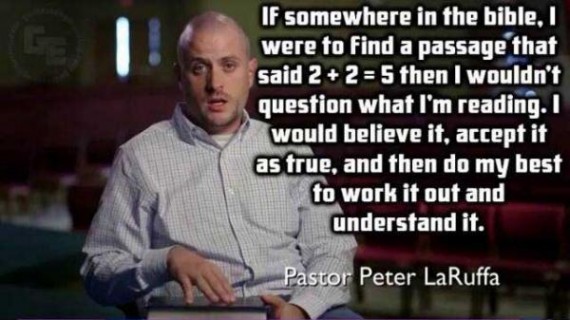 It is common among Calvinistic teachers and authors to say that the reason unbelievers cannot believe the gospel is because their minds have been darkened by the god of this age.
It is common among Calvinistic teachers and authors to say that the reason unbelievers cannot believe the gospel is because their minds have been darkened by the god of this age.
The primary proof text for this idea is 2 Corinthians 4:3-4.
But even if our gospel is veiled, it is veiled to those who are perishing, whose minds the god of this age has blinded, who do not believe, lest the light of the gospel of the glory of Christ, who is the image of God, should shine on them (2 Corinthians 4:3-4).
Calvinists focus in the statement about the minds of the perishing being blinded by the god of this age, and from this, teach that unregenerate people need the divine gift of regeneration before they can believe the gospel. Here is one such explanation from John Piper:
Since men are blind to the worth of Christ, a miracle is needed in order for them to come to see and believe. Paul compares this miracle with the first day of creation when God said, “Let there be light” (Piper, Five Points, 34).
But if this is not what Paul is teaching in 2 Corinthians 4:4, what is he saying?
The Veil on the Gospel
First, as with all the other passages which Calvinists quote, it is critical to understand the surrounding context. In the immediately preceding passage, Paul is explaining that the new covenant in the Spirit has replaced the old covenant of the law (2 Corinthians 3:6). He goes on to say that even though the new covenant is exceedingly more glorious than the old covenant, the Jewish people do not accept it because their minds have been veiled (2 Corinthians 3:14-15).
In fact, Paul even says that their minds are veiled regarding the proper way to read the Old Testament as well (2 Corinthians 3:14). The only way to read the Old Testament, he says, is through Jesus Christ. If someone does not believe that Jesus is the Christ, the veil remains.
The Gospel is Veiled to those who are Perishing (2 Corinthians 4:3-4)
This helps us understand what Paul is referring to when he says in 2 Corinthians 4:3-4 that the gospel is veiled to those who are perishing, and their minds are blinded. While Paul could be referring primarily to the Jewish people who are still unable to properly read and understand the Old Testament because they do not read it through the lens of Jesus Christ, it seems more natural to read Paul’s statement in light of his ministry to the Gentiles. “The ‘veil’ doesn’t just apply to Jewish people … it applies to people of all sorts” (Wright, 2 Corinthians, 42).
Paul, as the apostle to the Gentiles, undoubtedly ran up against this blindness on numerous occasions, and he is providing a brief explanation here for why some people do not respond to the gospel when it is proclaimed to them.
How to Remove the Veil on the Gospel
Paul, however, does not say that these people can never believe and will never believe. Quite to the contrary, Paul has clearly stated how the veil is removed, thereby implying that it can be removed. How is this? Paul wrote in 2 Corinthians 3:16 that “when one turns to the Lord, the veil is taken away.” While initially it might seem that Paul is referring to the initial act of faith in Jesus Christ by which people receive eternal life, the following verse shows that this is not at all what Paul is referring to.
In 2 Corinthians 3:17, Paul clarifies that “the Lord” he has just mentioned in 2 Corinthians 3:16 is not Jesus, but the Holy Spirit. He says, “Now the Lord is the Spirit” (N. T. Wright argues that the Spirit of the Lord is active in the fellowship of the saints, and this is where and how the veil is removed. See Wright, Paul and the Faithfulness of God, II:726).
 What this means is that when Paul talks about blindness and the veil in 2 Corinthians 3–4, he is not talking primarily about how a person receives eternal life by faith in Jesus Christ, but about all the other truths of the gospel which are contained in the rest of Scripture, and which are centered on the person and work of Jesus Christ.
What this means is that when Paul talks about blindness and the veil in 2 Corinthians 3–4, he is not talking primarily about how a person receives eternal life by faith in Jesus Christ, but about all the other truths of the gospel which are contained in the rest of Scripture, and which are centered on the person and work of Jesus Christ.
The “gospel,” remember, is not simply the message that eternal life is given to those who believe in Jesus for it. This truth is central to the gospel, but it is not the entirety of the gospel. The biblical gospel contains everything related to the person and work of Jesus Christ and the ramifications of these truths for our lives as His followers.
With all of this in mind, what Paul is saying is that nobody can understand the gospel unless they turn to the Holy Spirit for illumination and guidance. Once we do this, He not only removes the veil from our minds, but also helps us live out the truths of the gospel so that we are transformed “from glory to glory” (2 Corinthians 3:18).
In 2 Corinthians 4:4, Paul is saying that people who do not want to see the glorious truth of the gospel will remain darkened in their mind because the god of this age is certainly not going to reveal it to them. If they want to understand the gospel, all they need to do is turn to the Spirit of God for understanding, and he will remove the veil from their hearts and the blindness from their eyes so that they might be understand and obey the gospel of God. “Paul knew that … the gospel could and did pierce the veil” (Wright, 2 Corinthians, 42).
2 Corinthians 4:4 and the Light of the Gospel
That this is the proper way to read 2 Corinthians 4:4 is supported by the verse itself. Paul writes that those who are perishing “do not believe, lest the light of the gospel … should shine upon them.” Paul does not write that they do not believe because they cannot believe, or because the god of this age is preventing them from doing so.
No, Paul says they do not believe, because they do not want the light of the gospel to shine into their lives, thereby calling them to submit to Jesus Christ and Lord and follow Him with all their heart, soul, mind, and strength.
Paul is not the only one to make this sort of statement in Scripture. The Apostle John writes similarly in his Gospel, where he explains that although Jesus came unto His own people, they did not accept Him (John 1:1-8). And why did they not accept Him.
John explains why later. He says that they did not accept Him because their deeds were evil and they loved darkness rather than light (John 3:18-21). They did not want the light to shine in their lives, because they knew that if it did, they would have to change their beliefs and their behaviors, and so they chose to remain in darkness. Nevertheless, such a condition is not permanent. Jesus himself says that veil of darkness can be removed when the gospel is preached (John 6:45).
All of this is exactly what Paul writes in 2 Corinthians 3–4.
So does 2 Corinthians 4:3-4 teach the total inability of humanity? No, it teaches the necessity of the Holy Spirit to understand and live the Gospel.
If you want to read more about Calvinism, check out other posts in this blog series: Words of Calvinism and the Word of God.



 I deal with men who are mentally ill on a weekly basis at my job. Recently, a young man named Daniel came into my office and said he had a message for me from God. He handed me a note, which said this:
I deal with men who are mentally ill on a weekly basis at my job. Recently, a young man named Daniel came into my office and said he had a message for me from God. He handed me a note, which said this: Does a modern foot washing ceremony do this? Hardly. More often than not, people who attend these foot washing ceremonies make sure that they washed their feet in advance and scraped all the gunk out of their toenails. Then they wear a clean pair of socks and shoes.
Does a modern foot washing ceremony do this? Hardly. More often than not, people who attend these foot washing ceremonies make sure that they washed their feet in advance and scraped all the gunk out of their toenails. Then they wear a clean pair of socks and shoes.
 Yesterday we look at
Yesterday we look at  But in the Psalmist’s day, there was no such thing as atheism. Everybody believed in a God or gods. There were, however, many people who chose to live “godless” lives, that is, to live for themselves and not serve God. They believed that God existed, but they chose to not obey Him or follow His commands. It is this sort of person that the Psalmist has in mind in Psalm 14:1 (cf. 53:1).
But in the Psalmist’s day, there was no such thing as atheism. Everybody believed in a God or gods. There were, however, many people who chose to live “godless” lives, that is, to live for themselves and not serve God. They believed that God existed, but they chose to not obey Him or follow His commands. It is this sort of person that the Psalmist has in mind in Psalm 14:1 (cf. 53:1).

 Of all the various texts used to defend the Calvinistic teaching on Total Depravity, Romans 3:9-20 is one of the most popular (another being Ephesians 2:1-3). Rather than quote the entire passage, a few select verses from the beginning of this section are representative of the whole.
Of all the various texts used to defend the Calvinistic teaching on Total Depravity, Romans 3:9-20 is one of the most popular (another being Ephesians 2:1-3). Rather than quote the entire passage, a few select verses from the beginning of this section are representative of the whole.
 Up to this point, Paul’s objector was trying to argue that only the Gentiles were guilty, and that the Jewish people had a privileged status before God. Paul’s point in Romans 3:9-20 is that if the Jewish people did have a privileged position by virtue of having the “oracles of God” (Romans 3:2), then these oracles of God condemn them all as sinners, which puts them right back on equal footing with the Gentiles.
Up to this point, Paul’s objector was trying to argue that only the Gentiles were guilty, and that the Jewish people had a privileged status before God. Paul’s point in Romans 3:9-20 is that if the Jewish people did have a privileged position by virtue of having the “oracles of God” (Romans 3:2), then these oracles of God condemn them all as sinners, which puts them right back on equal footing with the Gentiles. 
 I used to be one of those Christians. I used to preach that very thing.
I used to be one of those Christians. I used to preach that very thing.


